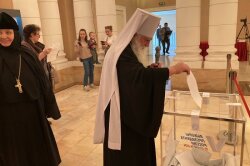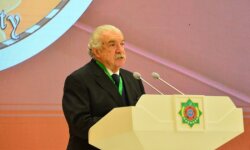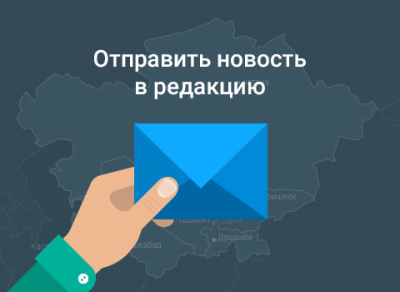 In Kazakhstan, the arrests of high-ranking government and security officials continue. According to law enforcement officers of the Republic, these officials may be involved in the rallies and riots in January. On March 17, Kairat Boranbayev, who is one of the richest people in Kazakhstan and close to the Nazarbayev clan, was placed in a detention facility.
In Kazakhstan, the arrests of high-ranking government and security officials continue. According to law enforcement officers of the Republic, these officials may be involved in the rallies and riots in January. On March 17, Kairat Boranbayev, who is one of the richest people in Kazakhstan and close to the Nazarbayev clan, was placed in a detention facility.
The arrests and resignations of some members of the elite do not add up to a clear understanding: who, why and how staged rallies and riots. The CentralAsia.news editorial staff asked a Kazakh political scientist Zamir Karazhanov to give an interview on some aspects of the January events.
In your opinion, the riots can be regarded as a great reason for “purges”? In principle, the “witch hunt” is justified?
— An arrest of high-ranking officials is not a must for change of elites. Enough to reshuffle the highest echelons of power and key positions, as was observed in Kazakhstan after the January events. Today, people who were previously reproached and suspected of offences are getting arrested.
The Kazakhstani media is placing emphasis on the criminal prosecution of the “Nazarbayev’s” elite. How did it form?
— Many of the detainees are from the entourage of the first President of Kazakhstan. They occupied high-ranking positions and worked their way into Nazarbayev’s confidence to commit crimes.
It appears that there was a trend?
— This situation is a natural consequence of over-centralized presidential control, the lack of independent political and public institutions, the crisis of the state machine and the imperfection of the legal framework, which was unable to limit the influence of the oligarchic circles in Kazakhstan. As a result, financial and oligarchic groups merged with the state machine, which allowed committing and covering up crimes at the level of authorities.
Well, it cannot be said they are “purging” only those close to Nazarbayev?
— As for the former President’s entourage, many of them continue to work in different positions, some of them are leaving government agencies. This process is being observed in the quasi-public sector – in state-owned companies.
When speaking about the highest level, did the elite change after removing Nazarbayev from the post of Chairman of the Security Council of Kazakhstan?
— The Security Council of the Republic comprises not only security agencies, but also departments responsible for the domestic and foreign policy and sustainable development of the country. For example, the Security Council discussed the pandemic as well. After the chairmanship of the Security Council was handed over to Kassym-Zhomart Tokayev, the transfer of power in the country was done.
It appears that the riots provoked a rotation in the Security Council?
— The events of January and subsequent riots hastened this process. The situation was getting out of control, decisive action was required on the country’s leadership to avoid an escalation in social violence.
The media reported that the President did not trust the security officials
— As for Tokayev’s trust in the security agencies, not everything is so straightforward here. For example, the ministers of internal affairs and defence retained their posts until the situation in the country became stable. However, dismissed Chairman of the National Security Committee Karim Masimov was arrested in the midst of the unrest. Most likely, the media reported not about the security agencies, but about the individuals and their role in the January events. The security agencies could indeed pose a great threat to the constitutional order of Kazakhstan, since they were often involved in the intra-elite struggle, and in Kazakhstan, they were severely deformed as an institution.
Is the inability to promptly respond to the onset of riots a result of the clan factor in the security agencies?
— After arresting a number of high-ranking officials, the role of law enforcement agencies in the hostile takeover of businesses and gross violation of the rights and freedoms of citizens began to unravel. Now Kazakhstan is facing an acute problem of reforming the security agencies. It should be acknowledged that law enforcement agencies were prone to corruption in the years preceding the January events. The agencies were unable to effectively combat crime. As a result, they encountered criminal elements during the riots and were not immediately able to ensure public order.
Some of the media publications told about the participation of militants allegedly brought from abroad in the riots. Can these mercenaries be considered a trigger factor in turning rallies into seizures of government buildings?
— The authorities of Kazakhstan assert a version of the imported militants. However, no evidence has been provided so far. Among those detained during the riots were foreign citizens. But they, most likely, found themselves in the swing of political events for various reasons. According to the official version, foreign fighters were recruited by certain representatives of the Kazakhstani elite, who were supposed to incite peaceful protesters to mass riots and destabilize the situation in the country. After which, some representatives of the elite could execute a coup d'état and seize power. This version cannot be ruled out.
It appears that the status of foreign mercenaries remains 100 percent unclear?
— The expert community has long assumed that power changed hands as a result of undercover struggles. Some of the high-ranking officials are now under arrest. It is quite possible that the roles of the detainees in destabilizing the political situation in January will become clear during the trial. It’s too early to say anything.
The attitude of the West to the events in Kazakhstan is quite interesting. In fact, the Republic did not fall under the sanctions?
— The reaction is restrained. Although the political institutions of the European Union approved a tough resolution on the January events in Kazakhstan, relationships with Western countries have survived. Moreover, Western leaders are discussing future cooperation with the Republic at the highest level.



